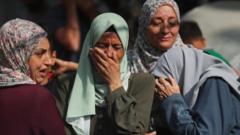Did Russia Just Attack a Ukrainian Prison, Leaving 16 Dead and Many Injured?

Understanding the Impact of Recent Airstrikes in Ukraine
The recent airstrike by Russian forces on a prison in southeastern Ukraine has raised significant concerns regarding humanitarian law and the escalating violence in the ongoing conflict. As reported, the attack resulted in the death of 16 individuals and left more than 30 others wounded. This tragic incident underscores the severe consequences of military actions in populated regions and highlights the ongoing plight of civilians caught in the crossfire. The Zaporizhzhia region, a frontline area, has been subject to frequent attacks since the onset of the full-scale invasion in 2022. This article delves into the details of the attack, its broader implications, and the international responses that followed.
The Details of the Attack
According to Ukrainian officials, the overnight airstrike involved eight high-explosive aerial glide bombs targeting a prison in Zaporizhzhia. Regional leader Ivan Fedorov confirmed that the attack not only demolished parts of the prison but also caused damage to surrounding residential areas. This incident is part of a broader pattern of Russian military aggression that has increasingly focused on civilian infrastructure and populated areas, exacerbating the humanitarian crisis.
War Crimes and Humanitarian Law Violations
The Ukrainian president's chief of staff, Andriy Yermak, condemned the airstrike, labeling it as "another war crime" committed by Russia. Such sentiments resonate with the statements made by Ukraine's human rights commissioner, who emphasized that attacking a prison constitutes a gross violation of humanitarian law. Under international law, individuals in detention retain their right to life and protection, making this attack particularly egregious. The implications of such military actions extend beyond immediate casualties; they contribute to a culture of impunity and suffering that affects countless lives.
The Context of Zaporizhzhia
Zaporizhzhia is one of the four eastern regions that Russia has claimed to have annexed since 2022. Despite these claims, the region remains largely under Ukrainian control, reflecting the complexities of territorial disputes in the ongoing conflict. The frequent targeting of Zaporizhzhia by Russian forces demonstrates a strategic approach aimed at undermining Ukrainian defense and eroding morale among the civilian population.
Escalating Violence in Dnipropetrovsk
In addition to the tragic events in Zaporizhzhia, recent missile and drone attacks in the Dnipropetrovsk region have further increased the toll on civilians. Reports indicate that a strike on the industrial city of Kamyanske resulted in two fatalities and several injuries. Furthermore, casualties were reported in the Synelnykivsky district, marking a concerning trend of escalating violence that continues to claim innocent lives.
International Responses and Political Implications
The global community has responded with alarm to the rising violence in Ukraine. Notably, U.S. President Donald Trump issued a stark ultimatum to Moscow, warning of impending sanctions if a ceasefire is not agreed upon soon. Trump's statements during his visit to Scotland underscore the increasing international pressure on Russia to halt its military actions. The prospect of economic penalties serves as a reminder of the interconnectedness of geopolitical stability and global economic health.
The Broader Humanitarian Crisis
The airstrikes and ongoing military operations in Ukraine have led to a profound humanitarian crisis. Thousands of civilians have been displaced, and access to basic necessities such as food, clean water, and medical care has been severely compromised. The destruction of infrastructure, including homes and hospitals, further exacerbates the situation, making it increasingly difficult for humanitarian organizations to provide aid.
The Role of Humanitarian Organizations
Humanitarian organizations are working tirelessly to provide assistance to those affected by the conflict. However, their efforts are often hindered by the ongoing violence and unstable conditions. Key challenges faced by these organizations include: - **Access to Affected Areas:** Continuous military operations can impede the ability of humanitarian workers to reach those in need. - **Resource Constraints:** The escalating conflict has strained resources, making it difficult to supply adequate food, water, and medical care. - **Safety Concerns:** Humanitarian workers themselves are at risk, and their safety is jeopardized by the unpredictable nature of the conflict. Despite these challenges, organizations remain committed to their mission of alleviating suffering and providing support to those affected by the war.
Long-Term Implications for Ukraine
The ramifications of the ongoing conflict will be felt for generations in Ukraine. The destruction of infrastructure, loss of life, and psychological trauma suffered by civilians create a complex landscape for recovery. The war has not only resulted in immediate physical damage but also long-term social and economic challenges that will require concerted efforts for reconstruction and healing.
Potential for Diplomatic Solutions
As the violence continues, there is an urgent need for diplomatic efforts to find a resolution to the conflict. Engaging in dialogue and negotiations could pave the way for a ceasefire and eventually lead to a more sustainable peace. International actors, including diplomats and humanitarian organizations, must continue to advocate for peaceful solutions, emphasizing the importance of dialogue over military action.
FAQs
What triggered the recent airstrikes in Zaporizhzhia?
The airstrikes were part of a series of military actions taken by Russian forces, targeting a prison and resulting in significant civilian casualties. These actions have been condemned as war crimes under international law.
How has the international community responded to the airstrikes?
International responses have included condemnation of the attacks and warnings of potential sanctions against Russia. The U.S. has issued ultimatums regarding a ceasefire, highlighting the geopolitical implications of the ongoing conflict.
What are the humanitarian implications of the conflict?
The ongoing conflict has created a severe humanitarian crisis, displacing thousands and complicating access to essential resources. Humanitarian organizations are actively working to provide support, despite facing significant challenges.
Could diplomatic efforts lead to a resolution of the conflict?
While the situation remains tense, there is hope that diplomatic solutions could emerge through dialogue and negotiation, potentially paving the way for a ceasefire and lasting peace.
The situation in Ukraine remains fluid and fraught with challenges. As we reflect on the human cost of the conflict, it becomes evident that there is an urgent need for a collective commitment to peace and humanitarian support. What steps can the international community take to ensure the protection of civilians in conflict zones? #UkraineConflict #HumanRights #PeaceEfforts
Published: 2025-07-29 07:45:04 | Category: world



